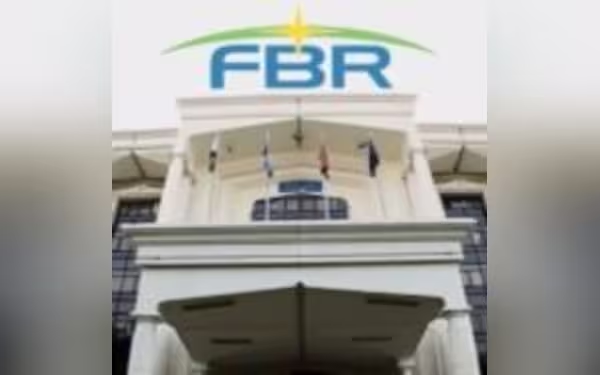Saturday, November 16, 2024 05:42 PM
Government Approves Rs32.5 Billion Package for FBR Enhancement
- Rs32.5 billion package approved for FBR efficiency.
- 1,100 new vehicles to improve operational capabilities.
- Performance-based salaries to incentivize top performers.
 Image Credits: pakistantoday
Image Credits: pakistantodayThe government has approved a Rs32.5 billion package to enhance FBR's efficiency, including new vehicles and performance-based salaries.
The Federal Board of Revenue (FBR) plays a crucial role in Pakistan's economy by collecting taxes and ensuring compliance with financial regulations. However, the FBR has faced challenges in enhancing its performance and efficiency over the years. In a significant move to address these issues, the Cabinet’s Economic Coordination Committee (ECC) has recently approved a substantial package worth Rs32.5 billion aimed at boosting the FBR's operational capabilities.
This six-month package is designed to provide the FBR with the necessary resources to improve its efficiency. It includes the procurement of nearly 1,100 new vehicles for FBR officers, which is expected to facilitate better mobility and operational effectiveness. Additionally, the package allocates funds for anti-smuggling measures, which are critical in safeguarding the country’s revenue. The government has also approved performance-based salaries, allowing top performers to earn up to four additional salaries, thereby incentivizing excellence within the organization.
Specifically, the plan earmarks Rs5.6 billion for the purchase of 1,087 cars with a 1,300cc engine capacity. Furthermore, a significant portion of the budget, amounting to Rs19.7 billion, is dedicated to anti-smuggling initiatives, which will be largely funded by reallocating resources from the existing budget. This strategic approach not only aims to enhance revenue collection but also to combat illegal activities that undermine the economy.
Under the Transformation Plan, which has received the endorsement of Prime Minister Shehbaz Sharif, several key initiatives are set to be implemented. These include the establishment of Digital Enforcement Stations along the Indus River and in Balochistan, the creation of 10 reinforced customs checkpoints, and the introduction of a customs tracking system. Such measures are expected to streamline operations and improve the overall effectiveness of the FBR.
Moreover, the ECC has approved the hiring of 148 retired military personnel to oversee customs posts, along with the creation of over 1,500 support roles to bolster anti-smuggling operations. This infusion of experienced personnel is anticipated to enhance the FBR's capacity to tackle smuggling and other illicit activities.
In addition to these measures, the establishment of a Model Tax Office is on the agenda, which will be staffed with third-party auditors and sector-specific experts. This initiative aims to improve the audit capacity of the FBR, ensuring that tax compliance is rigorously enforced. The allocation of Rs3.4 billion to enhance the operational capacity of tax officers is contingent on the results achieved in the current fiscal year, emphasizing the importance of accountability and performance.
Other noteworthy initiatives include a special allowance for officers in a new Reform Delivery Unit, funding for an MBA in Tax Management for new FBR officers, and capacity-building programs totaling Rs394 million. These efforts reflect the government's commitment to investing in human resources and professional development within the FBR.
Looking ahead, the government has expressed its intention to continue funding these initiatives in the next fiscal year, provided that the targeted results are met. This proactive approach not only aims to strengthen the FBR's capabilities but also to foster a culture of performance and accountability within the organization.
The approval of the Rs32.5 billion package represents a significant step towards enhancing the efficiency and effectiveness of the Federal Board of Revenue. By investing in resources, personnel, and training, the government is taking a comprehensive approach to address the challenges faced by the FBR. As these initiatives unfold, it will be crucial to monitor their impact on revenue collection and overall economic stability in Pakistan.













